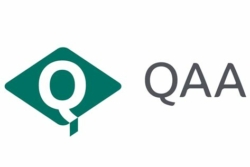 When launching new programmes or reviewing or making changes to existing ones, you’ll need to go through your own institution’s internal validation process (your Registry or similar function will be able to advise on this), as well as considering the Quality Assurance Agency’s subject benchmarks. You’ll also need to consider whether you wish to have the programme accredited by the appropriate professional institution.
When launching new programmes or reviewing or making changes to existing ones, you’ll need to go through your own institution’s internal validation process (your Registry or similar function will be able to advise on this), as well as considering the Quality Assurance Agency’s subject benchmarks. You’ll also need to consider whether you wish to have the programme accredited by the appropriate professional institution.
The Quality Assurance Agency for Higher Education (QAA) is the independent body entrusted with monitoring, and advising on, standards and quality in UK higher education.
Subject Benchmark Statements set out expectations about standards of degrees in a range of subject areas. They describe what gives a discipline its coherence and identity, and define what can be expected of a graduate in terms of the abilities and skills needed to develop understanding or competence in the subject. The QAA publish Subject Benchmark Statements for a range of disciplines – including engineering, on which they have worked closely with universities, the Engineering Council and the professional engineering institutions and so are aligned with the professional standards required by external professional or regulatory bodies in the discipline.
Benchmark statements are available for both bachelor’s and master’s level study. They not represent a national curriculum in a subject area. Rather, they allow for flexibility and innovation in programme design within an overall conceptual framework established by an academic subject community. They are intended to assist those involved in programme design, delivery and review and may also be of interest to prospective students and employers, seeking information about the nature and standards of awards in a subject area.
Subject benchmark statements for engineering:
More information:
- Accreditation and Quality Assurance Toolkit home
- About the Accreditation and Quality Assurance Toolkit
- Scotland
- Northern Ireland
- Wales
- Accreditation
- Enhancement
Any views, thoughts, and opinions expressed herein are solely that of the author(s) and do not necessarily reflect the views, opinions, policies, or position of the Engineering Professors’ Council or the Toolkit sponsors and supporters.

 When launching new programmes or reviewing or making changes to existing ones, you’ll need to go through your own institution’s internal validation process (your Registry or similar function will be able to advise on this), as well as considering the Quality Assurance Agency’s subject benchmarks. You’ll also need to consider whether you wish to have the programme accredited by the appropriate professional institution.
When launching new programmes or reviewing or making changes to existing ones, you’ll need to go through your own institution’s internal validation process (your Registry or similar function will be able to advise on this), as well as considering the Quality Assurance Agency’s subject benchmarks. You’ll also need to consider whether you wish to have the programme accredited by the appropriate professional institution.


